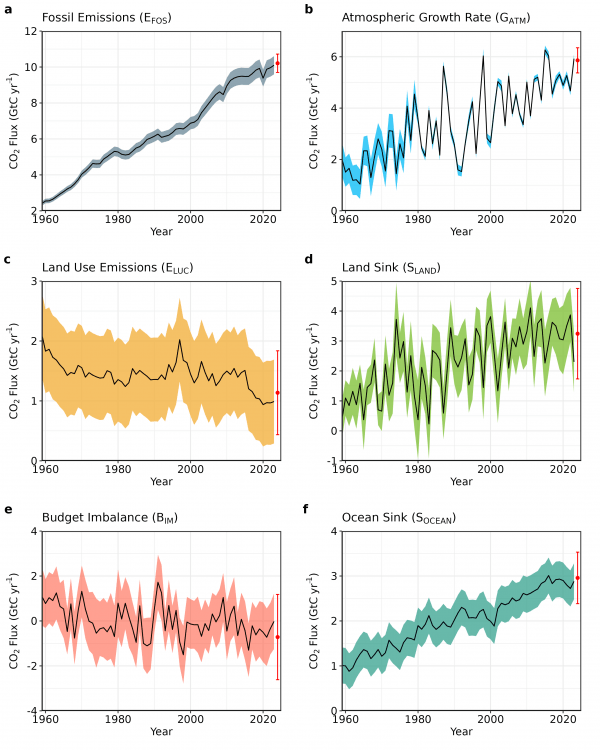But when we account for land-use change/agriculture, we account for net flux, which is the difference between what is going out [being emitted] and what is going in [being stored]. And he is saying this is not correct – that instead, we should treat things as ‘like to like’ and look at gross fluxes only. This might sound sensible, but it is complete nonsense because fossil fuels are essentially a one way flux [burning them emits greenhouse gases but doesn’t store them]. When we burn fossil fuels, coal, or gas, we release CO2 to the atmosphere.”
Wedderburn-Bisshop is also the executive director of the World Preservation Foundation, an organization with an objective to spread information that ‘animal agriculture is the leading cause of climate change’ – another potential bias toward the decisions made for his recent paper.
Over the last 10 years, fossil CO2 emissions have risen while land-use change CO2 emissions have declined on average,leaving overall emissions roughly level over that period.
This year, both fossil and land-use change CO2 emissions are set to rise, with drought conditions exacerbating emissions from deforestation and forest degradation fires during the El Niño climate event of 2023-2024.
............. https://science.feedback.org/agriculture-emits-greenhouse-gases-less-than-using-fossil-fuels-despite-recent-papers-claim/
Wedderburn-Bisshop (author of the recent ERL paper) laid the groundwork of his arguments for gross accounting across all sectors. Wedderburn-Bisshop’s main argument is that reforestation allows for uptake of CO2 emitted from both fossil fuels and deforestation.
In other words, he argues that newly grown forests do not choose which CO2 to uptake based on its original emission source, and thus this uptake should not be ‘subtracted’ only from land use/agriculture emissions.
However, Friedlingstein pointed out that this reasoning is flawed: given that both deforestation and reforestation are directly tied to human interventions, it makes sense to account for them together. Humans cause deforestation – emitting CO2 and reducing its uptake – but then also reforest around the world, increasing CO2 uptake. Friedlingstein explains reforestation must be accounted for in the total balance otherwise something would be missing.
It may sound ‘fair’ that, because forests take in CO2 from all sources, these sinks should be excluded from total land use emissions. However, this neglects the fact that climate scientists are specifically accounting for direct human intervention with these forests (through deforestation and reforestation) when measuring land-use emissions.
Natural carbon sinks from forests – those that occur in forests we aren’t directly altering – are not lumped in with land use emission accounting, but instead accounted for separately
https://geog.umd.edu/featured-content/global-fossil-co2-emissions-hit-record-high-no-end-sight


No comments:
Post a Comment